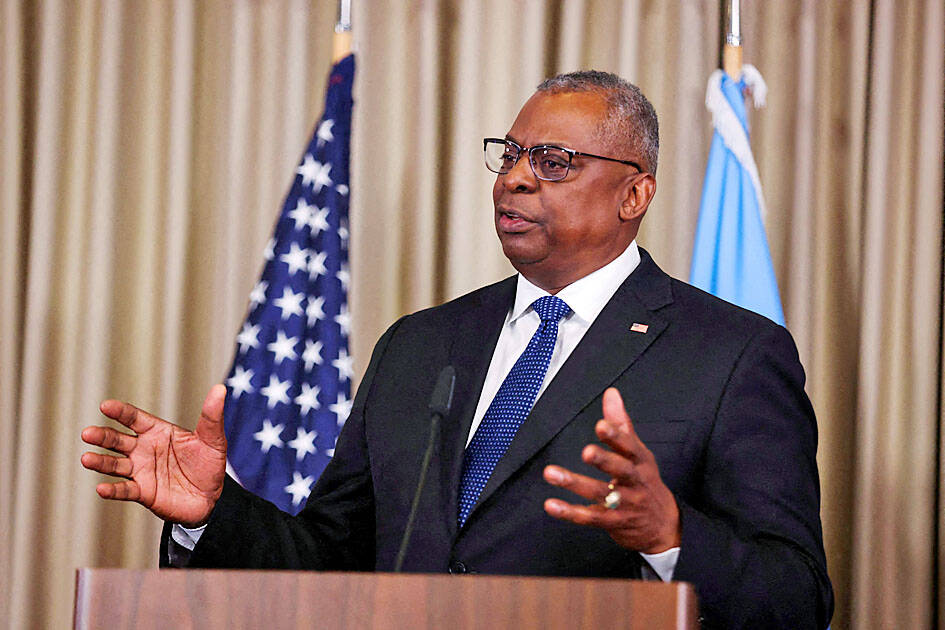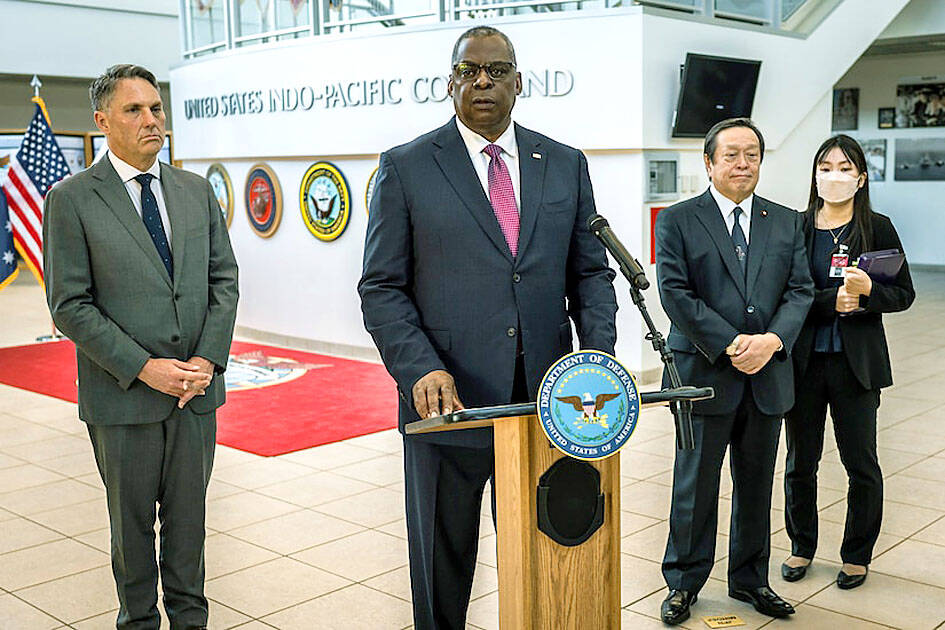The defense ministers of Australia, Japan and the US on Saturday agreed to advance military cooperation in the face of China’s growing ambitions.
“We are deeply concerned by China’s increasingly aggressive and bullying behavior in the Taiwan Strait, and elsewhere in the region,” US Secretary of Defense Lloyd Austin said as he welcomed his counterparts from Australia and Japan to the US military headquarters for the Pacific region in Hawaii.
“Our interest lies in the upholding of the global rules-based order. But we see that order under pressure in the Indo-Pacific as well, as China is seeking to shape the world around it in a way that we’ve not seen before,” Australian Minister for Defence Richard Marles said.

Photo: Reuters
The Japan Times yesterday quoted Japanese Minister of Defense Yasukazu Hamada as saying during the talks that “today, the international community is faced with these severe security environments due to Russia’s aggression against Ukraine, China’s unilateral change of status by force in the South and East China seas, and the remarkable development of North Korea’s nuclear and missile-related technologies, among others.”
“The three ministers ‘strongly condemned’ China’s ballistic missile launches during massive military exercises surrounding Taiwan” following a visit made by US House of Representatives Speaker Nancy Pelosi to Taipei at the beginning of August, the report quoted the Japanese Ministry of Defense as saying.
“On the rising tensions over self-ruled Taipei, the three also reiterated the importance of peace and stability across the Taiwan Strait, and agreed to encourage the peaceful resolution of cross-strait issues,” the ministry was quoted as saying.

Photo: Screengrab from US Department of Defense Twitter
The three ministers “pledged to ‘promote concrete and practical initiatives to ensure the security of the Indo-Pacific region’ and vowed to ‘continue to advance trilateral cooperation,’ including expanded and strengthened trilateral training and the promotion of defense equipment and technology cooperation ‘with the view to enhance trilateral interoperability,’” the Japan Times said.
“The defense chiefs also affirmed that the three countries would align their strategies ‘to continue to closely work together and remain committed to the region in order to realize a free and open Indo-Pacific and maintain and strengthen the rule-based international order,” the report said.
The US is pressing a diplomatic offensive to counter Chinese influence in the region.
On Thursday, Washington announced a US$810 million aid package for Pacific Island nations where the US plans to intensify its diplomatic presence.
US Vice President Kamala Harris last week traveled to Japan and South Korea, and said that the US would act without fear or hesitation throughout Asia, including the Taiwan Strait.

A Chinese aircraft carrier group entered Japan’s economic waters over the weekend, before exiting to conduct drills involving fighter jets, the Japanese Ministry of Defense said yesterday. The Liaoning aircraft carrier, two missile destroyers and one fast combat supply ship sailed about 300km southwest of Japan’s easternmost island of Minamitori on Saturday, a ministry statement said. It was the first time a Chinese aircraft carrier had entered that part of Japan’s exclusive economic zone (EEZ), a ministry spokesman said. “We think the Chinese military is trying to improve its operational capability and ability to conduct operations in distant areas,” the spokesman said. China’s growing

Nine retired generals from Taiwan, Japan and the US have been invited to participate in a tabletop exercise hosted by the Taipei School of Economics and Political Science Foundation tomorrow and Wednesday that simulates a potential Chinese invasion of Taiwan in 2030, the foundation said yesterday. The five retired Taiwanese generals would include retired admiral Lee Hsi-min (李喜明), joined by retired US Navy admiral Michael Mullen and former chief of staff of the Japan Self-Defense Forces general Shigeru Iwasaki, it said. The simulation aims to offer strategic insights into regional security and peace in the Taiwan Strait, it added. Foundation chair Huang Huang-hsiung

PUBLIC WARNING: The two students had been tricked into going to Hong Kong for a ‘high-paying’ job, which sent them to a scam center in Cambodia Police warned the public not to trust job advertisements touting high pay abroad following the return of two college students over the weekend who had been trafficked and forced to work at a cyberscam center in Cambodia. The two victims, surnamed Lee (李), 18, and Lin (林), 19, were interviewed by police after landing in Taiwan on Saturday. Taichung’s Chingshui Police Precinct said in a statement yesterday that the two students are good friends, and Lin had suspended her studies after seeing the ad promising good pay to work in Hong Kong. Lee’s grandfather on Thursday reported to police that Lee had sent

A Chinese ship ran aground in stormy weather in shallow waters off a Philippines-controlled island in the disputed South China Sea, prompting Filipino forces to go on alert, Philippine military officials said yesterday. When Philippine forces assessed that the Chinese fishing vessel appeared to have run aground in the shallows east of Thitu Island (Jhongye Island, 中業島) on Saturday due to bad weather, Philippine military and coast guard personnel deployed to provide help, but later saw that the ship had been extricated, Philippine navy regional spokesperson Ellaine Rose Collado said. No other details were immediately available, including if there were injuries among